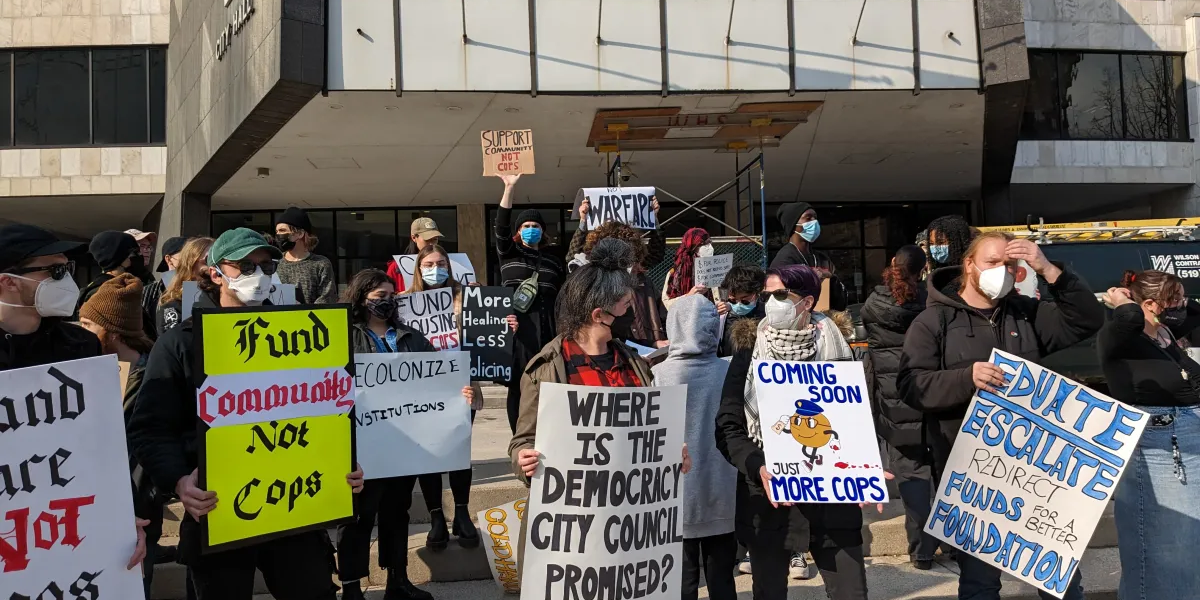On February 27, dozens of people gathered outside London, Ontario’s city hall in advance of a public participation meeting where council would hear feedback on the city’s proposed multi-year budget. This is the first budget put forward under the Ford government’s anti-democratic “strong mayor” powers, which effectively reduce council to a rubber stamp for the mayor.
The budget has been controversial among Londoners mainly because it includes a staggering $672 million increase in funding for the London Police Service (LPS), while starving services like transit, libraries, the arts, and support for the thousands of unhoused people in the city of desperately needed funds.
Organizing opposition to the police budget
The rally preceding the meeting was spirited, led by young organizers who expressed a radical, abolitionist critique of policing and its capitalist and colonial roots. The organizers invited those attending to imagine a more expansive vision of what it would mean for our city to be ‘safe’ than the one held by the police and their supporters. Shortly before the meeting was to begin, we filed into city hall, protest signs in hand. Once inside, we were split into four different groups: one allowed into the gallery of council chambers, and the rest sent to three overflow rooms.
After the chair read the most perfunctory land acknowledgement I have ever heard, the public participation meeting began. While a handful of speakers defended the proposed police budget, one local reporter estimated they were outnumbered four to one by critics. Those opposed to the budget represented a wide range of views: some said they were not opposed to more funding or personnel for the police, but that specific requests were unreasonable—the proposal for a new armoured vehicle came in for especially wide rejection.
Many others expressed more far-reaching critiques of policing and incarceration. One speaker spent her entire five minutes repeating variations of three demands– “house the homeless instead of funding cops,” “address climate change instead of funding cops,” “support mental health instead of funding cops”—like a collection of mantras. Many spoke from personal experience of LPS’s record of failing to truly keep people safe, including several sexual assault survivors who recounted the negligent and cruel way the police had treated them. Racialized, queer and trans speakers pointed out the ways police are a threat, rather than protectors, to them.
Collective opposition to the police budget
While planning for the meeting, I asked a comrade if we were going in order to participate, or to protest. Over the six or so hours of the meeting, I realized this was a false dichotomy, as the loosely organized group of those who’d come to express their opposition to the budget in one way or another developed a warm, combative, collective spirit, expressed in shows of support for ‘our’ speakers, which occasionally drew scolding from the chair for our violations of decorum.
This collective spirit was class-conscious: many speakers named the police as tools of the rich, sometimes directly naming Shmuel Farhi, the notorious and influential developer who owns a large portion of London’s real estate, including many of the buildings that sit empty while thousands struggle to survive on the streets. It was also internationalist. London has seen huge protests against Israel’s ongoing genocidal campaign in Gaza, anchored by the city’s large Palestinian and wider Arab diaspora communities—drawing a sometimes menacing police response. Keffiyehs and Palestinian flag pins abounded in the meeting, and many speakers ended their comments with “thank you, and free Palestine.” One speaker also said that he didn’t want London to become “another Cop City.”
Collectively, the budget’s opponents presented a devastating portrait of a city where the consequences of the capitalist crisis have created genuine desperation, forcefully arguing that policing can only reinforce these crises. They also articulated a clear alternative: taking resources away from the police and putting them towards the things that actually make our cities livable, from transit to housing, libraries and the arts. The meeting presented, on a relatively small scale, the struggle between genuine quality of life and democracy on one hand, and the police as the protectors of growing inequality and social crisis on the other.
Two days later, council voted against even considering any proposed changes to the budget. But, as one of the rally’s organizers said as we began leaving the overflow room, the fight is just beginning.
Did you like this article? Help us produce more like it by donating $1, $2, or $5. Donate

